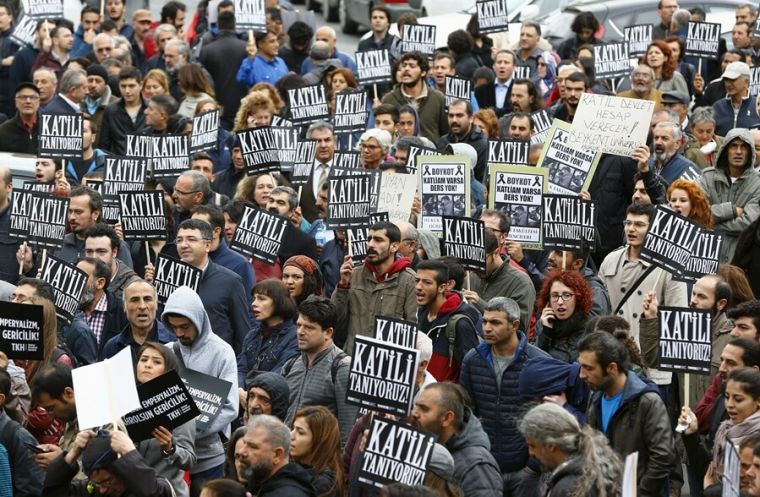Protesters blame Turkish government for death of 97 people in ISIS bombings

The Turkish government has been accused of failing to secure the safety of its people following the devastating Oct. 10 twin bombings in Ankara blamed on the Islamic State jihadist group, which left 97 people dead and hundreds injured.
Demonstrators in Istanbul and the capital Ankara expressed anger and dismay at the authorities, saying they abandoned the civilians attending the peace demonstration who bore the brunt of the bomb attacks for the sake of state security, according to IBTimes UK.
But this assertion was quickly disputed by the government, saying there had been no security lapses on the ground.
Turkish Prime Minister Ahmet Davutoglu also rejected the accusations that the Ankara bombings were a result of Turkey's involvement in the war in Syria, reports said.
"President [Tayyip Erdogan] and Prime Minister...every speech you make causes people to hate one another. Know your place. Stop turning us against each other. We are the Turks and Kurds dying everyday,'' said HDP leader Selahattin Demirtas in an angry speech he delivered before hundreds of protesters.
"The state, which gets information about the bird that flies and every flap of its wing, was not able to prevent a massacre in the very heart of Ankara,'' she added.
Metin Gurcan, a security analyst and former special-forces officer told IBTimes UK there was "a serious neglect of civilian security for the sake of state security" on the part of the government. He noted that the blasts could not have occurred if high-level officials from the government had been present at the gathering.
Servet Kaya, 40, an ethnic Kurd who was among those at the rally and whose four children died in the attacks, slammed state authorities for "fomenting hatred and violence to regain a majority in the parliament.''
"What I feel now is a total insecurity because my own state turned blind eyes on those who wanted to kills us,'' said Kaya.
There is still no claim of responsibility for the deadly attack although the Turkish government and pro-government media have reportedly pointed to strong evidence of ISIS-linked terrorists who infiltrated Turkish soil without being intercepted by the security officials, reports said.
Davutoglu said Monday two male ISIS militants were suspected of carrying out the twin suicide bombings.
He told Turkish broadcaster NTV in an interview that DNA tests were being carried out to determine the identities of the suspected bombers. A report in Yeni Safak, a newspaper close to the government, claimed DNA samples were being compared to those obtained from families of extremists authorities suspect could have carried out the attacks, said Fox News.
"It was determined how the suicide bombers got there," Davutoglu said. "We're close to a name, which points to one group."
The type of device and explosives used in Ankara were the same as those used in a suicide bombing reportedly by ISIS in July, the Hurriyet newspaper reported.
The Oct. 10 gathering was initiated by Turkish and Kurdish activists, seeking for increased democracy and an end to the renewed fighting between the Kurdish rebels and Turkey's security forces that has killed hundreds since July last year.
Davutoglu suggested in his interview that the Oct. 10 attack was an attempt to undermine the government ahead of parliamentary elections on Nov. 1.
On Oct. 11, the government declared three days of national mourning, while police detained 43 suspected ISIS members in several cities, including Konya, Izmir, Urfa and Antalya. Those detained in Izmir were released the same day.











